Public Enemies: The New Breed of Cop and Criminal
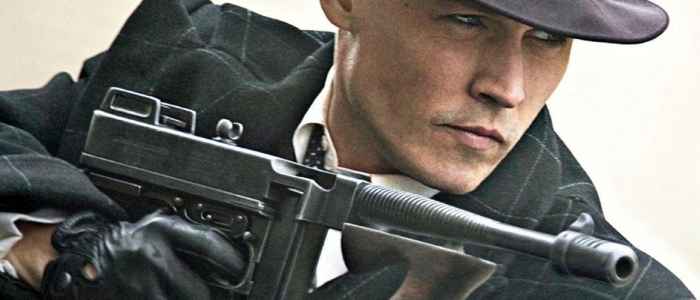
Imagine a kid saying he’d want to be a cop when he grows up. It’s kind of tough, isn’t it? Given the nasty tinge that the word “cop” carries with it nowadays, it wouldn’t be all that surprising to hear someone say they’d rather be a sumo’s personal fundoshi adjuster than have their name associated with any law enforcement agency. But if you rewound the clock back a hundred years or so, you’d probably discover that being a part of the local police department had a chivalrous aura that attracted many an adventurous youth. Like being a soldier, cowboy, or firefighter, being a junior G-Man was worthy of the utmost respect. You’d get to take down bad guys, rescue beautiful damsels, and ensure that at the end of the day, justice reigned supreme. What could be cooler than that?
Being a gangster, that’s what.
Even in the ’20s and ’30s, there was a steadily rising resentment towards the police, one which reached a fever pitch in 1919 and wouldn’t subside until 1939. The “Public Enemy Era,” as it’s often referred as, saw the rise of many homegrown outlaws who, after having to deal with the Depression, Dust Bowl, and the horrors of World War I, saw no use in adhering to the federal laws of the United States and decided to craft their own twisted moral codes which often involved the implementation of theft, intimidation, prostitution, bootlegging, murder, and every kind of criminal behavior in between.
Yet instead of being appalled by this criminal epidemic, large portions of the general public cheered them on, seeing them as dashing renegades who, though violent, were teaching the government to take care of their citizens lest they incur their wrath. For every crook that got his name printed in the paper, there were dozens of others who were utterly starstruck by them and who were more than willing to aid and abet them when possible. Flashing their zoot suits and slick, high-caliber weapons, outlaws like “Pretty Boy” Floyd, “Baby-Face” Nelson, Clyde Barrow and Bonnie Parker, Alvin Karpis, and John Dillinger were all admired by the young and old alike for their willingness to stick it to the politicians and bankers that had forgotten them. Worse still, the FBI was hardly equipped to face-off against these hardened killers, and given their association with the government, they received scant help from the citizens they were fighting to protect.
The result of the criminal’s viciousness, the law’s foolishness, and the public’s apathy was a pile of bullet-ridden corpses which was composed of individuals on both sides of the law and whose blood left an irremovable stain on the country’s history. It was a tumultuous time when morals were being torn apart and scattered in the wind, when the instinct for self-preservation trumped the call to self-sacrifice, and when, as depicted in the crime thriller Public Enemies, the romantic images of the Noble Lawman and the Charming Gangster were slain on the streets.
John Dillinger: The Charming Gangster
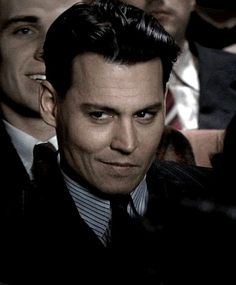
The worst thing about John Dillinger (played by Johnny Depp) is how magnetic he is. Were it not for the fact that he was a psychopath, there’d be innumerable things to like about him. He’s a guys’ guy who enjoys sports, cars, and whisky and he’s also a gentleman who doesn’t tolerate the maltreatment of women (unless he’s using them as a human shield). There’s also a likable brashness about him; if he sees a couple of guys listening to a ball game, he’ll go over, chat them up, and listen right along with them. If he sees a lovely woman, he woos her with remarkable ease. And, of course, if he sees a score, he takes it without hesitation. In essence, the reason he’s so fascinating is that he’s so comfortable being himself, to the point that he actually displays a measure of pride in what he does. As he used to declare to the press, no doubt with a fiendish grin on his face, “I rob banks for a living. What do you do?” Dillinger is guilty of many terrible things, but one would be hard pressed to accuse him of being either a hypocrite or a liar.
His frenetic, live-fast-die-young lifestyle is on display throughout the film’s entire running time. He hops from city to city, hitting as many banks as he can along the way, and even manages to earn the naive affection of a young woman named Billie Frechette (played by Marion Cotillard). As he tears his way through the Midwest, he earns himself the aforementioned celebrity status that was so common among criminals at that time, even to the point where he comfortably hides himself among the public, knowing full well that they see him as their personal angel of vengeance. He’s living the high life and he won’t give it up without a fight. Yet, as it so often happens with stories like these, the rush didn’t last for long, and by July 1934, at the age of 31, Dillinger was killed by federal agents.
The historical record is worth researching, but the interpretation of Dillinger’s story that Michael Mann presents is hauntingly poetic and worthy of its own analysis. Dillinger lived from moment to moment (in his words, “We’re having so much fun today, we ain’t even thinking about tomorrow.”) and he thought that after stealing enough people’s money, he could “retire” and live the rest of his life by his lover’s side. But forces, both lawful and criminal, saw to it that he’d pay for what he’d done.
The former is rather simple to explain. As seen in the film, J. Edgar Hoover (played by Billy Crudup) initiates a nationwide manhunt for Dillinger, offering thousands of dollars for any information pertaining to his whereabouts, and even declaring him America’s Public Enemy #1. He instructs the steely FBI agent Melvin Purvis (played by Christian Bale) to lead the charge against Dillinger and his cohorts. Needless to say, if you have a gang of hoods robbing banks, eventually law enforcement will be sent to stop them.
The real conundrum is this: why did Frank Nitti (played by Bill Camp), the muscleman of Al Capone’s bookmaking operations in Chicago, refuse to offer Dillinger and his gang help when they needed it most? If anything, you’d expect that there’d be a strict “honor among thieves” initiative in place that would ensure Dillinger’s safety. As it’s explained in the movie, the reason for Nitti’s refusal to harbor Dillinger is as elementary as putting two and two together; the FBI are after Dillinger, the FBI are bad for business, therefore, Dillinger is bad for business. That’s as logical an explanation as any, but it hints towards the tragic flaw (among many) that led to Dillinger’s eventual demise.
Dillinger didn’t just love being a bank robber, he also loved the idea of being a bank robber. To him, there was a cinematic panache that came with being an urban Robin Hood who, while not giving to the poor, at least stole from the rich. By possessing both the imagination and gumption to add a level of extravagance to criminality, Dillinger came to believe that his heedless nature would see him through in the end. He did what he wanted with a group of buddies that had his back and a pretty lady that would stay by his side no matter what.
But that’s not what gangsterism morphed into in the ’30s. Rather than being a swashbuckling hobby for the disillusioned and violent, crime became a genuine means of doing business for strict gangsters like Meyer Lansky, Frank Nitti, and “Lucky” Luciano, and they would not suffer the petulant exploits of a small town hick who thought he was living on top of the world. Imagine you’re a cook who, after years of honing your craft, has managed to open up a restaurant. You are successful in your enterprise, but then one day this young punk comes in who thinks he’s the new Emeril Lagasse and ends up driving away customers due to his reckless culinary antics. You’d have half a mind to toss him out as soon as possible, and that’s more or less what happened to Dillinger.
Having had enough of a guy who thought he could do things whenever he wanted, however he wanted, and wherever he wanted, the guys that sat at the top of the criminal hierarchy decided to withhold any sort of aid to Dillinger, considering him more of a liability than a potential business partner. With that, Dillinger and his gang were on their own; no more access to black market arms dealers, safe-houses, or getaway cars. If Dillinger wanted to set up a heist, he would have to set everything up without Chicago’s backing.
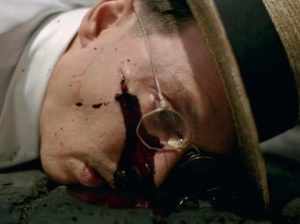
But on a deeper level, Dillinger’s story is very much like that of the bright-eyed youngster who is in love with the perception of something rather than it’s substantial form. Dillinger is a modicum of the ambitious businessmen who think that if they can make enough money then all of life’s problems will go away or the neglected women who think that Harlequin romances are an honest reflection of human intimacy. He is, at his core, a dreamer who rejects the seriousness of what he does, and by the end of the movie, his lack of discipline leads to him witnessing the deaths of all his companions, the arrest of the woman he loved, and all before earning a bullet to the back of his head.
Melvin Purvis: The Noble Lawman
Melvin Purvis may be a shoe-in for the saddest federal agent to have ever lived, his tragedy made all the more potent by the fact that his misfortunes and miscalculations are accurately portrayed in the film. Several agents did die under his command, he was responsible for the botched raid on the Little Bohemia lodge which left three civilians dead, and in the end, he did die by his own hand in 1960 (though there is some dispute as to whether it was a suicide or freak accident).
While his legacy does live on (being known as “the man who got Dillinger” is certainly impressive) Mann does a great job of highlighting the sorrowful nature of Purvis’ life, and how in some ways he complimented Dillinger very well, at least as far as the movie’s concerned. It goes without saying that both men were very different; one was lawful, the other an outlaw. One was stern and disciplined, the other was insolent. Yet the one thing that united them was their doomed devotion to the image they projected. In essence, Purvis was as much a dreamer as Dillinger, and when his dreams of sustaining a law abiding society crumbled, he crumbled right along with them.
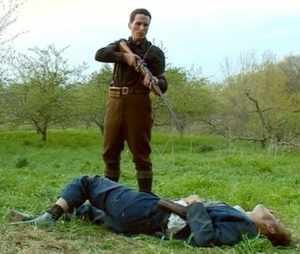
From the moment he’s introduced in the film, Purivs displays a remarkable amount of self-assurance and poise. As he chases “Pretty Boy” Floyd (played by Channing Tatum) through a backwoods apple orchard, it’s clear that he doesn’t look like a cop chasing a criminal; if anything, he exudes the mammoth confidence of a big-game hunter, carefully stalking his wounded quarry before delivering the kill-shot.
This confidence is what defines Purvis; even after he first hears of Dillinger’s criminal exploits in Chicago, he assures J. Edgar Hoover that he is the man for the job and that he will personally see to Dillinger’s arrest (or as he puts it, “Dillinger’s capture.”). Of course, this proves much easier said than done, and before the credits roll Purvis will have learned that the deeds of lawmen can often mirror the deeds committed by the criminals they chase.
The first setback that befalls him is an encounter with “Baby Face” Nelson (played by Stephen Graham) which proves fatal for one of his agents. Not to be deterred, he asks that Hoover allow him to hire the services of some professional lawmen who are more experienced in apprehending violent criminals. The embarrassment at having to ask for help is clearly expressed by Purvis and Hoover, but in the end it proves a wise decision. Through the combined efforts of Purvis’ agents and Charles Winstead’s (played by Stephen Lang) own posse, they do manage to capture Dillinger.
The scene that follows, in which Purvis visits Dillinger in Lake County Jail, is particularly vital in understanding the paradoxical nature of these men’s relationship. As stated, both of them have obvious differences, and in this moment, Dillinger simply takes to time to hurl insults at Purvis. Purvis, not having any of it, leaves, but not before telling Dillinger that the only time he’s going to leave his cell is, “…when we take you outside to execute you.” Obviously, neither man respects the other, but little do they know that they share the same quality; they both believe that they are on the winning side of their struggle and they are both fixated on maintaining their roles in the world.
This is a difficult point to make so perhaps it’s best juxtaposed with a scene from another Mann film, the amazing crime epic Heat. There is a similar moment when both cop and criminal meet and have a chat, but it’s only similar to Public Enemies in the sense that both parties meet face to face. The key difference is that Vincent (played by Al Pacino) and Neil (played by Robert De Niro) have a solid, if unspoken, respect for one another.
They reveal their weaknesses in this scene, not their strengths. Instead of preening like Purvis and Dillinger do, they admit that they are both highly flawed individuals. Neil accepts the fact that all he knows how to do is rob and murder people, but he doesn’t delude himself into thinking that his criminal career is glamorous in any way. Vincent, displaying just as much vulnerability, doesn’t waste their time together by sitting on his high horse, but rather admits that as good a cop as he is, his devotion to maintaining law and order has ultimately made him a neglectful husband and step-father. By the end of their conversation they realize that they actually have a lot in common, and while they are adversaries, they can relate to one another on several levels.
Purvis and Dillinger despise one another and are unwilling to acknowledge the underlying truth of their bond; while they live on opposite sides of the law, they both believe completely in what they represent. Purvis believed in the badge, Dillinger believed in the Tommy Gun, but they both share the same amount of zeal in trying to maintain their visions of the future, both on a grand scale and on an individual level. Perhaps that is why Public Enemies is much more violent than Heat. This clash of world-views is incredibly brutal, and when no quarter is shown to the other side, the only result is unrestrained bloodshed.
It must be stressed that Dillinger didn’t live on the same moral plane as Purvis. They were, respectively, evil and good and Purvis certainly deserved the praise he got when Dillinger was finally killed. But what makes it such a tainted victory is that Purvis had to become as cunning as Dillinger in order to take him down. It’s a given nowadays that sometimes police officers have to resort to violent measures in order to suppress potential or realized threats. But in the ’30s, when there was still a “knight-in-shining-armor” quality to law enforcment, it must have been very difficult for men like Purvis to adopt such tactics.
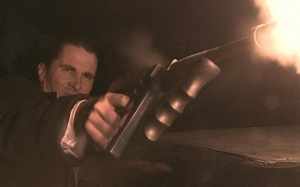
Returning to the story, Dillinger manages to escape from Lake County Jail and Purvis finds himself right back in the chase. After robbing another bank in Chicago, one of Dillinger’s gang is severely wounded and taken to a hospital. In that scene Purvis commits the first of his devious maneuvers when he allows one of his agents to torture the wounded man for information pertaining to Dillinger. The man reveals that they are hiding out in Little Bohemia and Purvis arranges an ambush that goes horribly awry. After accidentally killing three innocents and getting one of his own men killed, Purvis manages to rally his forces and ultimately learns that they have effectively wiped out Dillinger’s gang.
As much of a gain as they have made, Purvis realizes in that moment that what he faces is not just an external struggle, but an internal one as well. At this point in the movie, Purvis has lost much of the respect he once had for his position as a lawman, and while he still believes in the law, he finds himself and some of his compatriots unworthy of representing it. It wasn’t through courage and wit that he managed to kill most of Dillinger’s crew, but rather through vicious brutality and sheer dumb luck. And sure enough, it is that same blind fortune that leads to Dillinger’s death, one that Purvis is clearly upset over. Not because Dillinger didn’t deserve it, but because Purvis was so sure that he could keep himself clean and separate from Dillinger, when in the end, he had to do some pretty nasty things in order to make good on his oath to the law.
The World War II veteran Sam Hynes once said, “I don’t think there is such a thing as a good war. There are sometimes necessary wars, and I think one might say just wars.” Aside from the timely coincidence of that sentiment (WWII would start just five years after the events depicted in Public Enemies), it is also the fundamental lesson that Purvis learned after having to deal with Dillinger. If you were to watch the scene when Purvis kills Floyd back-to-back with the scene when Dillinger is killed, you will clearly see that Purvis is not the same man in both scenes. In the first, he was a lawman who believed that the violence he was committing was not only just, but good, a swift thrust from the sword of justice. In the second, he is a lawman tainted by the beliefs he once held, and while he may consider Dillinger’s death just, he certainly doesn’t think of the violence he committed as a good thing in and of itself.
Dillinger had no conscience so he never faced any sort of moral dilemma. Purvis, however, had to sacrifice major portions of his humanity in order to take down the country’s most dangerous criminal, and having to do so left him scarred. It may be true that the long arc of history bends towards justice, but what Purvis learned was that it doesn’t bend naturally. It must be forced by men willing to take down violent thugs through violent means, and while Purvis did eventually orchestrate Dillinger’s demise, it was not without a significant spiritual toll.
Billie Frechette: The Starstruck Public or Something More?
There is one other character in this film who is worth analyzing since she could be seen as a representation of the general public’s opinion at that time. If those reading this article had lived in the Midwest of the 1930s, there is a decent chance that they would have constituted a piece of what could be referred to as “the starstruck public,” the people who not only let the criminals of the time do what they wanted but also desired that they’d continue doing what they were doing. Though the majority of people in the country likely thought that what Dillinger and people like him were doing was wrong, there was still a recognizable portion of the population who sincerely considered them to be agents of revenge against a government that had failed to sustain their well-being.

There is, however, another possible reason that could explain how the public was seduced by Dillinger, and it comes with the inherent sense of worth that comes in knowing someone of great importance. While there were many people who would’ve loved to get the chance to meet Dillinger and ask how it was that he became so famous, there was only one woman who managed to achieve a level of intimacy that no other had or ever would, and her name was Billie Frechette.
Truth be told, Billie is a fairly easy character to read and understand, at least on the surface. Being a simple, relatively obscure girl from the Menominee Indian Reservation, Billie grew up without any exposure to the things that add spice to life. She had her family and friends, but there wasn’t much aside from that which helped her feel meaningful. But then here comes this handsome, debonair bank robber who only has eyes for her, and suddenly she’s on top of the world. Moreover, his was a whirlwind romance, which made her feel all the more important; because he didn’t spend time getting to know her or trying to find out if she’s compatible or not, Billie probably felt that he loved her with a truly abiding passion. Add in the fact that he’s got a decent chunk of change and a larger-than-life persona, and you’ve got the prototypical “bad boy” that so many women crave, and Billie was more than willing to give in to the temptation that Dillinger presented.
But is that really all that there is to her character? No, not by a long shot.
While it’s true that Billie is superficial to a degree, there are moments throughout the film where she displays an earnest love for Dillinger that transcended his wealth and public image. If Billie had really been in it just for the material gains, then she probably wouldn’t have endured the malicious treatment she received from federal agents, or for that matter, have been around long enough to have felt the heat coming around the corner. She would’ve bolted, gossiped about how she once dated Dillinger, and then just gone on with her life.
But Billie stayed. She saw something in Dillinger that the rest of the public didn’t, which implies that he showed her something that he didn’t reveal to anyone else. What might it be? It goes without saying that it’s open to interpretation, but a possible reason could be that Dillinger offered her the future. Not a material future, but a future period. This point is illuminated in the scene when Dillinger takes Billie out to eat for the first time. Billie points out that many of the patrons in the restaurant are paying more attention to her than they are to him. He asks why that is, and she says, “They’re looking at me because they’re not used to having a girl in their restaurant in a $3 dress.” Without any hesitation or false flattery, Dillinger replies, “Listen doll, that’s cause they’re all about where people come from. The only thing that’s important is where somebody’s going.”
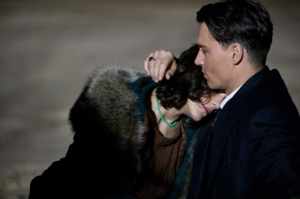
Dillinger is making it clear that he is a man who always looks to the future; for inspiration, for exhilaration, for everything. And though he doesn’t say it right out, he hints that he wants Billie to be a part of that future. What more could a woman from embarrassingly humble beginnings want than a man who is willing to ignore her fairly nondescript past while promising to forge a brilliant future with her by his side. To look forward is one of the pillars of classical romances. It is what frees people from the prison of the past and gives them the promise of experiencing the bounties of life. In this regard, Billie is far from the gold-digger that some may paint her as; if anything, she desires to be a part of Dillinger’s life in spite of his being a bank robber, not because of it. She wasn’t just in it for the money, and she certainly wasn’t in it for the thrill. What she wanted more than anything was the future that her beloved offered her. But ultimately, she proved to be a victim of her own unrealized fantasies.
Sound familiar?
Public Enemies is a great movie and one that far too many people dismiss since it was made around the time when Mann started adopting a more artsy approach to his films. But while it is his last lucid and genuinely exciting movie, it is also his most tragic. On the surface, it’s all about how people experienced the birth of a new breed of cop and criminal, both of whom proved to be alien to anything that anyone had seen. But just like any other birthing, it involved a substantial amount of pain, the source of which was people having to give up their sentimental notions of unsullied constables and dashing rogues. It’s by no means a nihilistic film since good does triumph over evil and is presented as being morally superior, but it’s a brave enough film to show that one has to find a way to make compromises with how they see the world and how the world really is. Without that grace, all that ensues is chaos and disappointment, which were the only things the characters in this film experienced.
What do you think? Leave a comment.











This is such a great idea for an article, and timely, as you suggest in your introduction. Aspiring to do good works rather than aspiring towards the uniforms traditionally associated with them.
Mitch,
I appreciate the comment and agree with your point. People really should look at the underlying meaning of the symbols we hold dear rather than admire the symbols themselves.
-August
I thought it was one of the best movies of 2009. Definitely up there with The Hurt Locker, Inglourious Basterds, Up, State Of Play etc. Although not a great year for the movies, ths was a real standout film with its great performances, intense action scenes, terrific cinematography & a tremendous score!!!
dowel,
From a technical standpoint the film kind of annoyed me (personally, I’m not one for the faux-documentary style that Mann adopted for it) but the story is what elevated it and made it one of the most thoughtful crime films I’ve ever seen.
Thanks for the comment,
August
The big question here is why isn’t this movie better than it actually is?
LA,
I’d probably say it’s the aesthetics. At this time Mann was using HD cameras and a pseudo-documentary style to tell his stories which he’s used for films like Miami Vice and Blackhat. While the story was great, it ultimately didn’t work on a technical level.
Still, the character arcs and themes at play made it a thrilling and thoughtful film.
Thanks for the comment,
August
I enjoyed this, it was nice to see Johnny Depp playing someone normal,(not a cartoon character).
canada,
I hear you; it’s a shame that he doesn’t have more “human” roles under his belt. While he’s certainly an eclectic actor, and a great one to boot, there aren’t many roles where he’s presented as a realistic person facing human problems. But who knows, maybe he’ll take another role like this one someday.
Thanks for the comment,
August
‘Public Enemies’ doesn’t quite reach the heights of Mann’s masterpieces ‘Heat’ and ‘The Insider’
Luigi,
I agree; I’d say the only two movies that Mann made before Public Enemies that I didn’t care for were Ali and Miami Vice (I haven’t seen The Keep, though I haven’t heard many flattering things about it). Heat, The Insider, and Collateral were outstanding movies with deep themes and fully realized characters, as were some of his other movies like The Last of the Mohicans and Thief.
But if there was one movie from the latter half of his career that I’d consider great, it’d be Public Enemies. While it does suffer from some of his “highly realistic” camera work, it at least works on a story and character level. While not enough to make it as good as Heat or The Insider, it still makes it a memorable movie.
Thanks for the comment,
August
This is a great topic, considering everything that’s been going on lately. It’s a shame that the public has such a low opinion of police these days. I always thought that this was purely a result of the actions of bad cops, but your consideration of the way in which the public has historically romanticized criminals is interesting, too.
Nicole,
I appreciate the kind words.
-August
I liked Public Enemies. I didn’t love Public Enemies (the way I love Bonnie and Clyde). It was a good movie, but I didn’t think it was a great movie, by any means. It was solidly entertaining. I think it could’ve been better, especially if it had focused more exclusively on Dillinger and didn’t include quite so many characters. Christian Bale, in particular, I thought wasn’t put to very good use in this film, even though he played the role better than anybody else could’ve, and he was still excellent (as he is in nearly every role he’s in).
Forsythe,
I disagree, I think the inclusion of Bale’s character was what made the film so good in the first place. Without him, the movie would’ve felt a bit too much like a modern desperado film with Dillinger at its center.
It’s interesting that you mention Bonnie and Clyde, which I’ve seen as being a bit overrated. While it’s certainly a thrilling crime film with great characters, I don’t see it as a cultural landmark of any kind.
Perhaps the inclusion of a law enforcer who provided a different angle to the story is what made me enjoy Public Enemies more than Bonnie and Clyde.
Thanks for the comment,
August
Funny story, I hated this movie when I first saw it in theaters, hated it. Almost walked out.
Watched it a second time with my parents at their house, and for some reason I started really enjoying it.
Watched it a third time , and now I am hooked.
Great Movie, went completely under the radar, and that’s pretty tragic.
Daboo,
I’m right there with you. I remember seeing it once with my dad in theaters and not being too impressed. Then I saw it a second time and thought, “Okay, this is decent.” Then by the third time, I thought it was great.
I think it may have been because one the first two go arounds,I couldn’t get over how distracting the camerawork was. I’m usually pretty tolerant about pseudo-documentarian cinematography, but Mann seemed to go overboard with it. But after a while, I was able to overlook it and really concentrate on the story.
Thanks for the comment,
August
I was expecting something like a mix between “Heat” and “The Untouchables” but it wasn’t good.
ALANIZ,
Based on the way the film was advertised, I can certainly see why you’d see it as a mix of those two movies. In the end, I still enjoyed it though.
Thanks for the comment,
August
A Strong movie and the strongest climax i have seen in so many years.
Whelan,
It was a very exciting film. I appreciate the comment.
-August
The Dillinger story presented here is no where near the quality of the 1960’s epic Bonnie & Clyde.
Rhea,
It’s a bit difficult for me to say which film had the better criminal dynamic seeing as how Dillinger was a lone while Bonnie and Clyde were lovers and therefore had a romantic relationship that became a criminal partnership.
Perhaps in that regard Bonnie and Clyde does have a better dynamic, but I still think Dillinger’s story was very dramatic in its own way.
Thanks for the comment,
August
Very in depth article!
Joseph,
Thanks for the kind words.
-August
What I really liked in this film was the alternating between action sequences, romantic ones and the moments of complicity between friends.
Rich,
You’re right; it was a fine film with fully-realized characters.
Thanks for the comment,
August
I haven’t read Dillinger’s life story, so I can’t comment on how close the film is to portraying the real man, or how accurate is, but there were a couple of scenes which didn’t seem to fit.
furrrr,
Which scenes in particular?
Thanks for the comment,
August
Thank you for sharing.
CSlattery,
Thank you for reading.
-August
Mann is a genius when it comes to the epic crime saga.
Thanh,
I agree, especially when it comes to Heat and Collateral. Though Public Enemies isn’t as good as either of those, it’s still a fine crime movie.
Thanks for the comment,
August
Great article, I have always loved this movie. Michael Mann’s features are a masterclass in technical precision and suspense. He is one of few directors working today to embrace genre conventions overlooked by the general audience.
Thomas,
Thank you for the kind words. And you’re right about Mann’s technical acumen; while his pseudo-documentary style can get a bit distracting at times, he is still a fine craftsman in terms of storytelling and cinematography (usually).
Thanks for the comment,
August
This article made me rethink some of my preconceived notions of the gangster myth in our society. It sends that the public event era had allot in common with the gangsta era of the 90’s.
I think broad comparisons can be made through the eyes of race relations between the stardom of the criminals on Public Enemies and the infamy of NWA and the rap group Public Enemy and how they the police.
During this tone the groups and many like them and done criminal elements were idolized because in the urban community while larger society thought they were worst than enemies of the state. Perhaps it’s because they didn’t look like most of America, they were so demonized while at the same time films were being made about the modern Mafioso that were humanizing though more seedy than the older gangster flicks.
fchery,
You’re certainly correct to point out that there have been a number of times since the ’30s (and, more than likely, several times before) when criminals were put on a pedestal by a disillusioned public.
Thanks for the comment,
August
Interestingly, one of the main reasons for the resentment toward the police throughout the 20s had to do with Prohibition. That was the reason for romanticizing gangsters (they provided the booze).